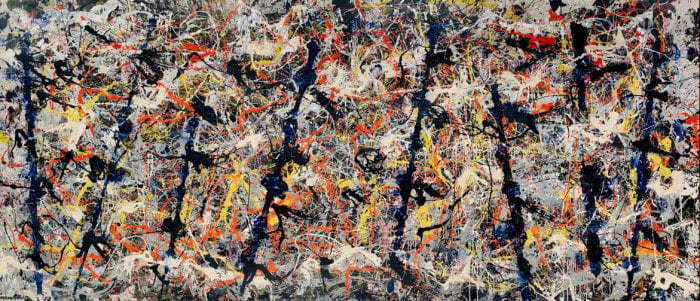
During his relatively short life in the public eye, Jackson Pollock became a force to be reckoned with. Born in Cody, Wyoming, in 1912, far away from the scene that would make him a legend, he created an entire style with his unmistakable “drip paintings” in the mid-1940s, transforming Modern American Art and the cultural fabric of a nation.
Influenced by Native American art in his early life, and certain aspects of Surrealism and Modernism later, Pollock produced his “action painting” with the canvas set on the floor, allowing the paint to drip from a stick or directly from the paint can, and later adding depth by using a trowel or a knife. Throughout this process, Pollock allowed the paintings take on a life of their own.
The creative risks he took in his practice earned him recognition alongside Abstract Expressionists, including Willem de Kooning, Barnett Newman, and Mark Rothko. Even among them, he had a reputation for questioning traditional boundaries, and his life struggles generated almost as much fascination as his work.
To commemorate the rebellious artist’s 105th birthday, we selected 9 of his most thought-provoking quotes:
On Painting:
“The painting has a life of its own. I try to let it come through.”
On Time and Space:
“The modern artist is working with space and time, and expressing his feelings rather than illustrating.”
On Being an Artist:
“Painting is self-discovery. Every good artist paints what he is.”
On Communication:
“It doesn’t matter how the paint is put on, as long as something is said.”
On Success:
“The secret of success is… to be fully awake to everything about you.”
On Modernism:
“New needs need new techniques. And the modern artists have found new ways and new means of making their statements…the modern painter cannot express this age, the airplane, the atom bomb, the radio, in the old forms of the Renaissance or of any other past culture.”
On Technique:
“Technique is just a means of arriving at a statement.”
On Friendship:
“A real friend is someone you say a sentence to and they know ten thousand words behind that sentence.”
On Love:
“Love is friendship set to music.”